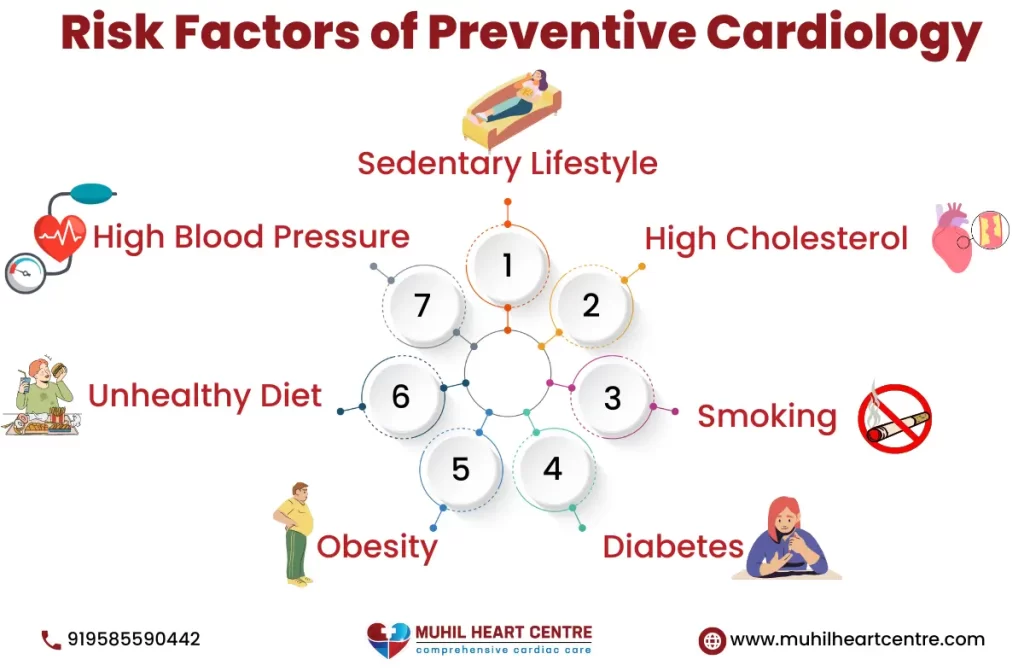Preventive cardiology is a medical specialty that focuses on identifying and addressing risk factors for cardiovascular diseases (CVD). Preventive cardiology in Vellore ensures the prevention of the occurrence or reduce the impact of cardiovascular diseases, including conditions such as coronary artery disease, heart attacks, strokes, and heart failure. However, many cases of CVD can be prevented or managed through early detection and appropriate interventions.
When to see a Preventive Cardiologist?
A preventive cardiologist plays a critical role in promoting cardiovascular health and reducing the risk of heart disease. They assess individual cardiovascular risk factors, develop personalized prevention plans, and provide guidance on lifestyle modifications.
Our preventive cardiology in Vellore encompasses a multidimensional approach that involves risk assessment, lifestyle modifications, pharmacological interventions, and patient education. Our approach includes:
Risk Assessment
Preventive cardiology begins with a comprehensive evaluation of an individual’s risk factors for CVD. This evaluation includes obtaining a detailed medical history, performing a physical examination, and conducting various diagnostic tests.
These tests may include blood pressure measurement, lipid profile analysis (to assess cholesterol levels), blood glucose monitoring (to evaluate diabetes risk), and assessment of a family history of heart disease. By assessing these risk factors, healthcare professionals can determine the individual’s overall cardiovascular risk and develop a personalized preventive plan.

Pharmacological Interventions
In some cases, lifestyle modifications alone may not be sufficient to manage cardiovascular risk factors. In such instances, pharmacological interventions are prescribed. Medications are used to control risk factors such as high blood pressure, high cholesterol levels, and diabetes.
Commonly prescribed medications for preventive cardiology in Vellore may include antihypertensives, lipid-lowering drugs (statins), antiplatelet agents, and antidiabetic medications. These medications are used in conjunction with lifestyle modifications to optimize cardiovascular health.
Patient Education and Counseling
Patient education plays a vital role in preventive cardiology. Healthcare professionals provide patients with knowledge and tools to understand their cardiovascular risk factors and actively participate in their prevention and management.
Patients are educated about the importance of medication adherence, regular monitoring of blood pressure and lipid levels, and compliance with lifestyle modifications. Counseling may also address emotional well-being, mental health, and coping strategies, as these factors can influence cardiovascular health.
Regular Monitoring and Follow-up
Regular monitoring and follow-up are crucial components of preventive cardiology in Vellore. Healthcare professionals track patients’ progress, assess the response to interventions, and make necessary adjustments to treatment plans.
Regular check-ups help identify emerging risk factors, monitor the efficacy of medications, and address any concerns or challenges that patients may face. Monitoring may include blood pressure measurements, lipid profile analysis, blood glucose monitoring, and other diagnostic tests as needed.
Special Considerations
Preventive cardiology also takes into account specific populations and conditions that may require additional attention. For example:
- Women’s Cardiovascular Health: Recognizing that cardiovascular risk factors and outcomes can differ in women compared to men. Special consideration is given to hormonal influences, pregnancy-related conditions, and menopause-related changes.
- Genetic Risk Factors: Identifying individuals with genetic predispositions to certain cardiovascular conditions and offering genetic testing and counseling when appropriate.
- Childhood and Adolescent Prevention: Focusing on preventing the development of risk factors and promoting healthy lifestyles from an early age to reduce the long-term burden of CVD.
- Secondary Prevention: Addressing the needs of individuals who have already experienced a cardiovascular event, such as a heart attack or stroke, to prevent further complications and improve long-term outcomes.
Lifestyle Modifications We Recommend for a Healthy Heart
One of the cornerstones of preventive cardiology in Vellore is encouraging individuals to adopt healthy lifestyle habits. Lifestyle modifications play a critical role in reducing the risk of CVD. Healthcare professionals provide guidance on various aspects of a heart-healthy lifestyle, including:
- Diet: Promoting a balanced and nutritious diet that is low in saturated and trans fats, cholesterol, and sodium. The experts at preventive cardiology in Vellore advise patients to include fruits, vegetables, whole grains, lean proteins, and omega-3 fatty acids in their diet.
- Physical Activity: Encouraging regular exercise and physical activity, which can help maintain a healthy weight, improve blood pressure, cholesterol levels, and glucose metabolism, and enhance overall cardiovascular fitness.
- Smoking Cessation: Assisting individuals in quitting smoking or using tobacco products. Smoking is a significant risk factor for CVD, and quitting can lead to significant cardiovascular benefits.
- Weight Management: Emphasizing the importance of maintaining a healthy weight through a combination of diet and exercise. Obesity is associated with an increased risk of CVD and other health problems.
- Stress Management: Educating individuals about stress management techniques, as chronic stress can contribute to the development and progression of CVD. Techniques such as relaxation exercises, meditation, and engaging in enjoyable activities can help reduce stress levels.
FAQ
1.What is Preventive Cardiology, and How Does it Differ from Traditional Cardiology?
Preventive cardiology focuses on identifying and addressing risk factors for cardiovascular diseases before they lead to serious health issues. Unlike traditional cardiology, which often deals with the diagnosis and treatment of existing heart conditions, preventive cardiology emphasizes lifestyle modifications, early detection, and interventions to reduce the likelihood of heart problems. In Vellore, our preventive cardiology services aim to empower individuals with the knowledge and tools needed to maintain heart health proactively.
Who Can Benefit from Preventive Cardiology Services in Vellore?
Preventive cardiology is beneficial for individuals of all ages, particularly those with risk factors such as high blood pressure, high cholesterol, diabetes, family history of heart disease, and a sedentary lifestyle. Our services cater to both adults and children, offering comprehensive risk assessments, personalized lifestyle interventions, and early detection of potential heart issues.
What Services Does Preventive Cardiology in Vellore Include, and How Can I Access Them?
Our preventive cardiology services in Vellore encompass a range of offerings, including risk assessments, lifestyle counseling, nutritional guidance, exercise prescriptions, and screenings for conditions like hypertension and hyperlipidemia. To access these services, individuals can schedule an appointment with our preventive cardiology team
Conclusion
To conclude, preventive cardiology in Vellore is a comprehensive approach to reducing the burden of cardiovascular diseases. It is a proactive approach that empowers individuals to take charge of their cardiovascular well-being and reduce their risk of developing life-threatening heart conditions.
Read also Imaging Cardiology in Vellore.

